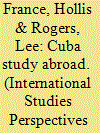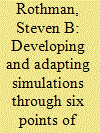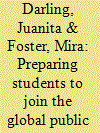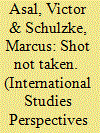|
|
|
Sort Order |
|
|
|
Items / Page
|
|
|
|
|
|
|
| Srl | Item |
| 1 |
ID:
117728


|
|
|
|
|
| Publication |
2012.
|
| Summary/Abstract |
In an attempt to meet the goal of internationalizing the curriculum and equipping students for the twenty-first century and beyond, schools have engaged themselves in a myriad of study abroad programs. These programs, in keeping with many of these schools' missions, are intended to encircle students with a more critical global awareness. While study abroad programs are promoted as self-identity discovery tools, through which students can construct new national identities that transcend national borders, this paper, based on interviews conducted with College of Charleston students who studied in Cuba during spring 2007 and 2009 semesters, explores the relationship between the study abroad experience and identity formation. We argue that these encounters not only allow students to interrogate what it means to "be American" beyond the emotional, physical, and intellectual bounds of the United States, but also how their previous conceptions of self and nation can strengthen, not contradict, a global context.
|
|
|
|
|
|
|
|
|
|
|
|
|
|
|
|
| 2 |
ID:
117731


|
|
|
|
|
| Publication |
2012.
|
| Summary/Abstract |
The essay describes a new way to evaluate variation among simulations through six distinct categories. The six points involve the content of the simulation, the integration of the simulation with other aspects of the course, the length of a simulation, the strictness of rules, the interaction among students during the simulation, and assessment techniques. The essay assesses the benefits and costs of the simulation and course design through student feedback and instructor evaluation. In addition, the essay uses these six points of variation as a framework to explain a sample simulation integrated with course objectives, goals, lecture material, two short research essays, and other class activities designed to teach game theory applied to current international problems. The simulation uses current world issues to help students incorporate class content, game theoretic modeling, and strategic interaction into an international negotiation conducted in class.
|
|
|
|
|
|
|
|
|
|
|
|
|
|
|
|
| 3 |
ID:
117727


|
|
|
|
|
| Publication |
2012.
|
| Summary/Abstract |
Understanding the institutional identity (as opposed to the organizational one) of non-governmental organizations (NGOs) within structures of global governance is the main theme underpinning this work. Studies documenting the quantitative rise of the NGO sector in world politics have largely neglected the qualitative impact of that development. The institutional identity of NGOs is particularly important when considering the NGOs in light of the new links and relationships they have created with state-centric structures of world politics. To this end, this article offers network institutionalism as a theoretical tool to address that gap and to serve as a bridge between NGO studies and international relations (IR). In an effort to develop an institutional perspective on NGO studies, the article integrates network theories with historical and sociological strands of the new institutionalism. Building on this theoretical discussion, and after introducing the key assumptions of network institutionalism, it offers four broad clusters of research directions for further NGO studies as a way to think about future NGO studies in a more comprehensive manner while also stimulating new research directions that can strengthen the study of NGOs and the study of IR.
|
|
|
|
|
|
|
|
|
|
|
|
|
|
|
|
| 4 |
ID:
117730


|
|
|
|
|
| Publication |
2012.
|
| Summary/Abstract |
Just as public policy was once debated over newspapers in Parisian cafes, today's global policy debates take place in the blogosphere and on social networks. Admission to the lettered city of the twenty-first century demands not just constant connectivity but also rapid comprehension and succinct writing. Preparing students to participate in the global public sphere requires supplementing their directed research skills with monitoring skills, then showing them how to communicate in public debate. In selected undergraduate International Relations courses at San Francisco State University, students hone monitoring skills by following news feeds in RSS feed readers and course management systems. Textbooks then become a source of context for understanding the latest developments in regional issues. Suggested Web sites and a Facebook forum provide students with access and encouragement to communicate with experts on course topics. By engaging online, students repurpose technologies and social skills from their daily lives for educational ends. Examination questions cover relevant current events, briefing papers replace term papers, and course assessment measures reward students for experimenting and improving throughout the semester. Because this approach to online participation and current events monitoring may be unfamiliar to students, the course design and simulation activities encourage students to draw on small group support while developing their individual skills and confidence.
|
|
|
|
|
|
|
|
|
|
|
|
|
|
|
|
| 5 |
ID:
117729


|
|
|
|
|
| Publication |
2012.
|
| Summary/Abstract |
The American military has been engaged in combat operations first conventional and then counterinsurgent for more than 8 years and the issue of political violence from a variety of different directions is an important issue to address in the college classroom. In this paper, we focus on the pedagogy of the ethics of political violence of jus in bello (the ethics of activity within war). We present an overview of three different ethical perspectives that can be applied to ethical dilemmas as they relate to political violence and then a series of scenarios that can be used to start discussions with students about the ethical dilemmas faced by both insurgents and counter insurgents and possible solutions that the ethical literature offers.
|
|
|
|
|
|
|
|
|
|
|
|
|
|
|
|
| 6 |
ID:
117726


|
|
|
|
|
| Publication |
2012.
|
| Summary/Abstract |
This article examines the strategic wisdom of the US Predator drone campaign in Pakistan, particularly in light of the dramatic expansion in the number of strikes that has occurred under the Obama administration. First, it examines whether there is a compelling rationale for any drone strikes in Pakistan by evaluating the justification advanced by US authorities and the three main criticisms that have been leveled against the campaign. With the help of an original database of drone strikes and their effects compiled by the authors of the article, it shows that the criticisms lack merit and that some strikes may be justified in principle. Second, it turns to the reasons explaining the dramatic increase in strikes over the past 2 years. On examination, it finds that the arguments supporting the expansion of the campaign are forceful but not necessarily decisive. In the third section it considers some objections to an expanded campaign. Finally, in the closing section, it weighs these considerations against the points favoring the expansion of the drone strikes. The article ends with the conclusion that on balance it would be prudent to shift back towards a more narrowly focused campaign concentrating on al-Qaeda, the Afghan Taliban and only leaders of the Pakistani Taliban.
|
|
|
|
|
|
|
|
|
|
|
|
|
|
|
|
| 7 |
ID:
117725


|
|
|
|
|
| Publication |
2012.
|
| Summary/Abstract |
International trusteeship of post-conflict territories by multilateral institutions or foreign states received renewed attention in the wake of its application in Kosovo and East Timor during the 1990s. Subsequently, interventions in Afghanistan and Iraq have contributed to the intensity of critical discussion over post-Westphalian sovereignty approaches and competing norms regarding human rights, nationalism, and security. This article seeks to establish normative and practical criteria for the application of the trusteeship model to weak, fragile, or post-conflict societies. In particular, I propose that consent of the local population, multilateral international approval and participation, and absence of local institutional capacity for effective governance form the key dimensions of the legitimacy and feasibility of a potential international trusteeship. Building on the literatures on quasi-states, state building, liberal institutionalism, and critiques of international intervention, the article tests the utility of these criteria through illustrations of international trusteeships in East Timor, Kosovo, and through a more extensive analysis of the Palestinian territories. It concludes that, despite frustrations over the Israel-Palestinian peace process in the absence of intensive external intervention, the Palestinian territories do not meet the proposed criteria for the effective and legitimate application of an international trusteeship.
|
|
|
|
|
|
|
|
|
|
|
|
|
|
|
|
|
|
|
|
|